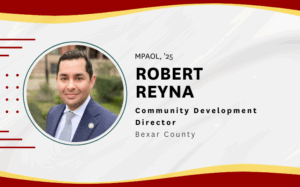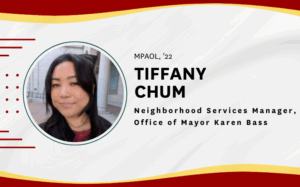Adam Blackstone is an Executive Master of Health Administration (EMHA) alum dedicated to serving Southern California. He shares his journey in healthcare leadership and explains how the EMHA program elevated his skills, strengthened his connections, and inspired him to make an impact in healthcare policy.
As the Senior Vice President of Communications and Event Management for the Hospital Association of Southern California he leads strategic communications, public affairs, advocacy, messaging, and event initiatives that support more than 170 hospitals across six Southern California counties. Blackstone’s focus is on elevating the voice of hospitals in healthcare policy discussions through media, storytelling, and legislative engagement.
Q: What did you do prior to starting your degree?
A: Before beginning the EMHA program in 2014, I held senior communications roles at multiple hospitals in the greater LA area. I started working in hospitals in high school and later as a unit secretary in college. Healthcare became my career path, even though it wasn’t planned at first. I found fulfillment in working with people and stayed in the field.
In those roles, I handled media relations, internal and external communications, crisis response, and community engagement. Many of those skills are the foundation of what I do now, but today I work on a broader scale, supporting an entire region of hospitals.
Q: What motivated you to pursue the EMHA program?
A: At the time, healthcare was undergoing a huge transformation with the Affordable Care Act. I realized that to grow beyond communications, I needed to deepen my understanding of strategy, finance, technology, healthcare leadership, and health systems. The program’s comprehensive curriculum and collaborative cohort gave me that.
Q: Why did you choose USC’s EMHA specifically?
A: I first heard about the program through colleagues and USC alumni in healthcare. My CEO at the time was an alum, as were several peers who recommended it. After researching, I found that the EMHA blended academic rigor with real-world application. The flexible online format allowed me to balance career and family, while the Trojan network and USC’s reputation added unmatched value.
Q: What were your healthcare policy and leadership goals going into the program?
A: My goal was to broaden my leadership skills and influence healthcare policy on a larger scale. Having worked only in hospitals, my ability to create system-wide change was limited. I wanted to prepare for executive roles that would allow me to impact policy and strategy beyond one institution.
Q: What was your academic experience with the online modality and in-person residencies?
A: The online modality was seamless and engaging. It allowed me to balance my executive role and family responsibilities while collaborating closely with professors and peers.
The in-person residencies were a highlight. They offered immersive workshops, networking, and projects that mirror challenges I now face in my career. Those sessions strengthened the professional relationships I still maintain today.
Q: How did you balance the program with your personal and professional life?
A: Time management was critical. I dedicated consistent blocks of time each week and communicated openly with my family and team so they knew they remained priorities. Discipline and boundaries made it manageable—and absolutely worth it.
Q: What were your interactions with professors and peers like?
A: My professors were thought leaders who genuinely cared about student success. Many remain mentors and continue to provide guidance.
My peers came from diverse healthcare backgrounds, offering perspectives I wouldn’t have otherwise encountered. We challenged and supported each other, which enriched the academic experience and built a network that continues today.
The relationships I formed have been invaluable. Many of my peers remain colleagues today, and we continue to support each other in committee meetings and professional projects.

Executive Master of Health Administration Online (EMHA)
Advance Your Career
Gain practical skills and model effective leadership in a rapidly evolving health care environment.
Find Out MoreQ: Was there a healthcare policy project you found especially impactful?
A: Yes, during one residency, we worked on a project focused on enhancing access, quality, and cost of care within a Southern California region. It foreshadowed the work I now do at the Association, where we strategize and advocate for hospitals to meet those very demands.
Q: What lesson from the program has stayed with you most?
A: To always remain a student. Healthcare is constantly evolving, and maintaining curiosity and openness is critical. You can never know everything, but you can always keep learning.
Q: How did the EMHA program make you a better healthcare leader?
A: The program gave me tools, confidence, and perspective to lead with purpose. It deepened my understanding of how finance, clinical care, operations, and healthcare policy intersect. Most importantly, it reinforced that healthcare is a human enterprise—we must always prioritize both staff and patients.
Q: What does the Trojan network mean to you?
A: I was influenced by Trojan leaders even before joining the program. Since then, I’ve built lasting relationships with peers who’ve become mentors and collaborators. It’s a community I can always rely on for insight and support. Today, I often sit alongside them in committees and boardrooms—it’s truly lifelong.
Q: Would you recommend the EMHA program to prospective students?
A: Absolutely. My advice is to enter with clear goals, fully engage in the experience, and make the most of every connection. The program goes by quickly, but it’s transformative.
Q: Anything else you would like to share?
A: Since graduation, I’ve remained in touch with professors, including Michael Harris, who has continued to mentor me. He’s even attended association meetings where I now lead initiatives, which shows how lasting and impactful the Executive Master of Health Administration academic experience has been.



